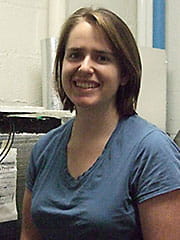Emily Gardel
Harnessing Bacteria for Energy
By Stacy Kish on August 4, 2010

Photo credit: Christopher Diperna
Fellow: Emily Gardel
Hometown: Acton, MA
Undergrad: Smith College
Graduate school: Harvard University
Keywords: Department of Energy, American Recovery and Reinvestment Act, Office of Science, Graduate Fellow program, Bacteria, Energy
Emily Gardel wanted to find a project that fused her personal interest with research. She found the perfect blending of the physical sciences with an environmental application. “I am interested in how we can use bacteria to generate electricity,” said Gardel, a doctoral candidate at Harvard University and a DOE Graduate Fellow.
“When humans respire, we take up electrons and transfer the electrons onto oxygen,” explains Gardel. Bacteria can do this same process with or without oxygen. “The scientific community is interested in how we can harness the electrons deposited by bacteria during respiration as a potential energy source.” Gardel admits the species used in these studies are not terribly exotic. “Grab dirt from your backyard and you can find bacteria related to the two most common bacteria used in these studies -- Geobacter sulfurreducens, Shewanella oneidensis.”
This is still a fairly young field, explains Gardel. “We really do not understand how bacteria physically transport electrons to the surface.” A similar process is currently being used in microbial fuel cells that power remote devices on the ocean floor. These microbial fuel cells last for on the order of decades without parts needing to be replaced. “In addition to energy applications, this work could also be used for bioremediation,” said Gardel.
“My advisor, Peter Girguis, is a marine microbiologist and he was enthusiastic to have a physicist like me on his team to work on this project,” said Gardel. “This fellowship will not only help me financially, but it will allow me to get together with all of the other fellows and energy scientists.” Gardel’s graduate fellowship is funded by the American Recovery and Reinvestment Act of 2009.
Stacy Kish is a Science Writer with the Office of Science


